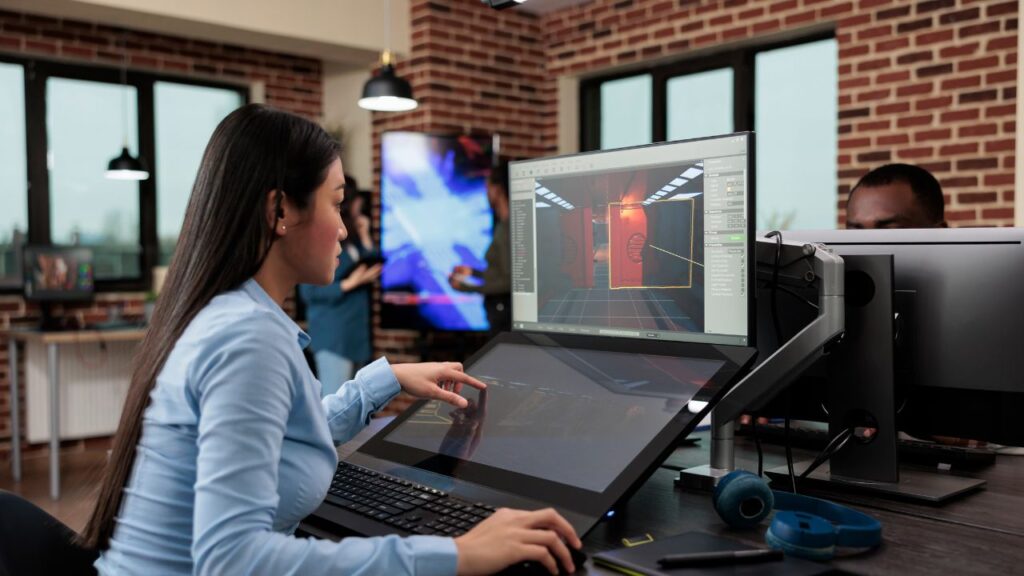Choosing the right game engine can make or break your game development project. Both new and experienced developers face this tough decision every day. Unity and Godot are two of the most popular choices, but they work very differently.
Unity offers powerful 3D graphics and industry-standard tools, while Godot provides a free, open-source solution with an easy-to-learn interface. Each engine has clear strengths that appeal to different types of developers. Unity dominates the professional game industry with advanced features and strong performance. Godot attracts indie developers with its simple design and zero cost.
The choice between these engines depends on your project goals, budget, and experience level. This guide will explore how their core features compare, examine their performance differences, and help you decide which engine fits your needs best.
What Are the Core Features and Architecture Differences?
Unity uses a component-based architecture with C# scripting, while Godot employs a node-based system with GDScript. Both engines support multiple platforms but differ in their user interfaces and asset handling approaches.
Which Platforms Do Unity and Godot Support?
Unity supports over 25 platforms including Windows, Mac, Linux, iOS, Android, PlayStation, Xbox, and Nintendo Switch. The engine excels at console deployment with official support from major platform holders.
Unity also supports emerging platforms like WebGL, Apple TV, and various VR/AR headsets. Developers can publish to most commercial platforms without additional licensing fees.
Godot supports fewer platforms but covers the most popular ones. It works on Windows, Mac, Linux, iOS, Android, and web browsers through HTML5 export.
Console support in Godot requires third-party solutions or custom porting. The engine focuses on open platforms rather than proprietary console systems.
Godot’s export system is simpler but less comprehensive than Unity’s. Most indie developers find Godot’s platform support sufficient for their needs.
How Do Their User Interfaces Compare?
Unity’s interface uses a traditional window-based layout with separate panels for scenes, hierarchies, and inspectors. The component system lets developers attach scripts and behaviors to game objects.
Unity’s workflow centers around prefabs and scenes. Developers drag components onto objects and configure them through inspector panels.
Godot’s interface features a node-based visual editor that shows game structure as a tree. Each node represents a game element with specific functions.
Godot’s scene system works differently than Unity’s. Everything in Godot is a node, and developers build games by combining different node types.
The node approach makes Godot more intuitive for beginners. Users can see exactly how game elements connect and interact.
How Do They Handle Asset Management?
Unity uses an Asset Database system that automatically imports and manages files. The engine converts assets into optimized formats and tracks dependencies between files.
Unity’s Package Manager handles external libraries and tools. Developers can install add-ons directly through the editor interface.
Asset bundles in Unity allow dynamic loading of content. This feature helps reduce initial download sizes for mobile games.
Godot uses a simpler file system approach for assets. The engine references files directly without complex import processes.
Godot’s resource system handles asset loading and memory management automatically. Files like images and sounds work immediately after adding them to the project.
The simpler system in Godot means faster iteration times. Developers spend less time waiting for assets to import or process.
Performance, Community, and Pricing
Unity offers strong performance for both 2D and 3D games with extensive community support, while Godot provides a lightweight alternative with growing community backing and completely free licensing.
How Do Unity and Godot Compare in Performance?
Unity delivers excellent performance for 3D games. The engine uses C# scripting and optimized rendering pipelines. Mobile games run smoothly on most devices when properly optimized.
Large studios choose Unity for AAA titles because it handles complex graphics well. The engine supports advanced lighting and particle effects.
Godot performs very well for 2D games. The engine is lightweight and starts up quickly. 2D games often run faster than Unity equivalents.
For 3D games, Godot 5.0 has improved significantly. The new Vulkan renderer provides better performance than older versions. However, Unity still leads in complex 3D scenarios.
Performance comparison:
- 2D Games: Godot often faster, smaller file sizes
- 3D Games: Unity typically better for complex projects
- Mobile: Unity has more optimization tools
- Loading Times: Godot starts faster, smaller builds
What Kind of Community Support Can Developers Expect?
Unity has a massive community with millions of developers worldwide. The Asset Store contains thousands of ready-made scripts and models. Developers can find solutions to almost any problem quickly.
Unity tutorials cover every topic imaginable. YouTube channels, online courses, and documentation are extensive. Job opportunities are plentiful for Unity developers.
Godot has a smaller but growing community. The community is very helpful and welcoming to new developers. Response times on forums and Discord are usually quick.
Godot documentation is clear and well-written. The number of tutorials is increasing rapidly. However, fewer third-party assets are available compared to Unity.
Community resources:
- Unity: Large asset store, extensive tutorials, job market
- Godot: Helpful community, good documentation, growing resources
How Much Do These Engines Cost?
Unity uses a subscription model with different pricing tiers:
- Personal: Free for projects earning under $100,000 yearly
- Plus: $1,800 per year for companies earning under $200,000
- Pro: $3,000 per year for larger companies
- Enterprise: Custom pricing for big studios
Unity Personal includes a splash screen requirement. The engine also takes a revenue share in some cases.
Godot is completely free and open source. No licensing fees, no revenue sharing, no splash screen requirements. Developers keep 100% of their profits.
Companies can modify Godot’s source code if needed. This freedom appeals to many indie developers and small studios.
Cost comparison:
- Unity: Free tier available, paid plans for larger projects
- Godot: Always free, no hidden costs or revenue sharing



